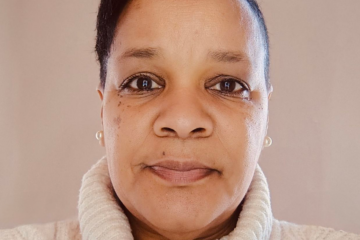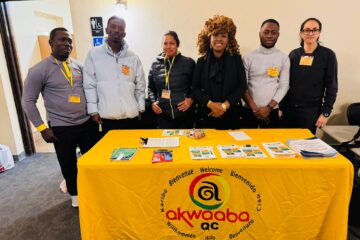By Emily Blobaum, Fearless editor
Editor’s note: This is part two of a two-part series on mutual aid organizations in Iowa produced by the Business Record in conjunction with our Fearless initiative, which focuses on women and gender topics with an intersectional approach. While mutual aid organizations are not new, the work has become more known, thanks in part to social media and renewed calls to action in the social justice space. Mutual aid organizers strive to create better communities for all, which affects all sectors of our state. Thousands of Iowans contribute to and lead mutual aid efforts – and we could only talk to a handful of them for this series. Have a story idea for future coverage? Reach out to Business Record Editor Emily Barske at emilybarske@bpcdm.com
The idea of mutual aid has been around for centuries. The way people define it differs slightly, but if there’s one thing that everyone can agree on, it’s that mutual aid is predicated on a high level of community involvement.
The Business Record talked with a few organizers about their work and why they do what they do. Some of the following organizations are relatively new. Others have existed for decades.
The Supply Hive: ‘We’re more than just food. We want to do more.’
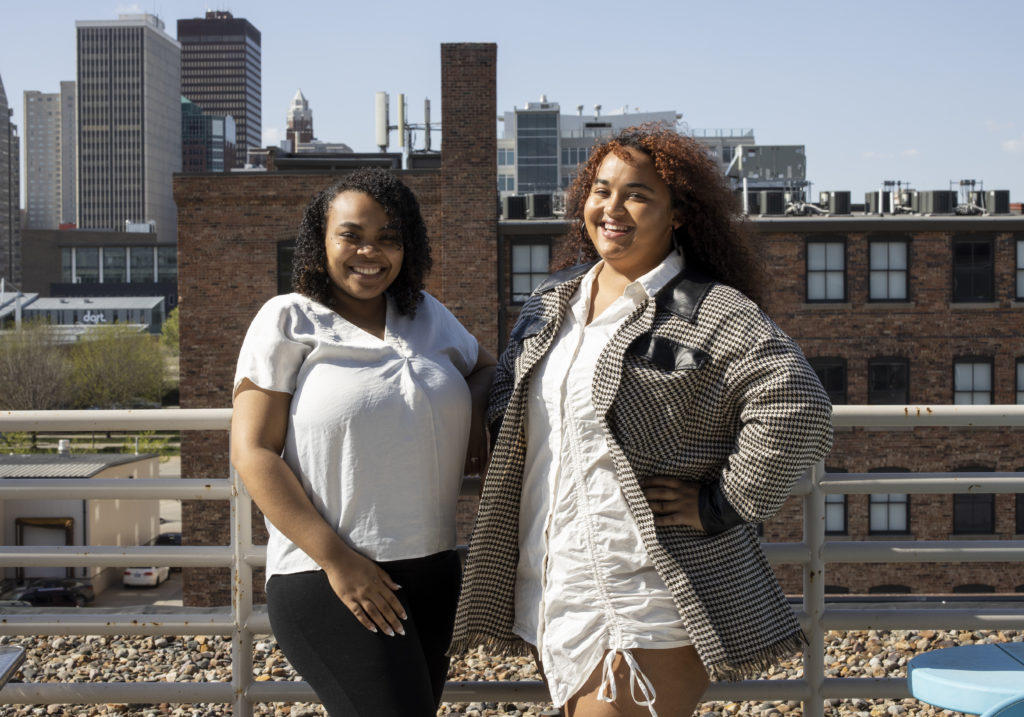
June 2, 2020, was the fifth day of what would become a long, hot, humid summer filled with protests, rallies and vigils dedicated to victims of police brutality. When Zakariyah Hill woke up that morning, she called her longtime friend Aaliyah Quinn.
Hill and Quinn had been out on the streets with cardboard signs, chanting and marching with hundreds of other Des Moines-area community members. At the end of each day, they were exhausted. They saw a need for food and water.
“What if we collect donations, get friends together, go shopping for groceries and then make sandwiches in my backyard?” Hill asked Quinn.
After raising $1,000 a few hours after posting QR codes linked to their Venmo and CashApp accounts on social media, Hill, Quinn and a handful of other friends drove to Sam’s Club and bought a trunkload of ingredients to make 500 turkey, ham and PB&J sandwiches for people participating in a march to Des Moines Mayor Frank Cownie’s home.
From there, their organizing efforts grew exponentially.
“We thought it was going to last a week or until the sandwiches ran out, but people just wanted more from us,” Hill said.
By the end of the month, Hill and Quinn had filed articles of incorporation to become a 501(c)(3) and became the Supply Hive – the name serving as an homage to honeybee qualities of teamwork, community, sustainability and joy.
Since then, the Supply Hive has hosted and led more than two dozen events and initiatives, including fundraising drives, a fashion show, community events, educational Zoom presentations and a community garden.
The following conversation has been edited and condensed for clarity.
Why did you decide to start the Supply Hive?
Hill: Complacency. I felt this repetition of doing the same thing every day. There wasn’t anything thrilling or rewarding or giving about it and I knew I had it in myself to do more. I have the health, the passion and the education. As a Black woman, I’m not at the top layer of privilege, but I do have some sort of privilege that I can use to my ability in order to help others.
Quinn: I like to try new things. I’ve been doing a lot of work for years doing things like walkouts. Being able to take a lead this time and not standing back … I love to challenge myself. There’s nothing wrong with going to protests and having signs, but I felt that I needed to do more and so the Supply Hive gives me the advantage to do more.
Who does the Supply Hive serve?
Hill: Everybody. There’s no gatekeeping. The conceptual idea of the Supply Hive is bees. We’re all one and the same and we’ve got the same stripes on. There’s no requirements that you have to meet to be on the giving side or the receiving side. You can be on both. Even as the heads of this organization, we’ve been on both. We’re here for anybody and everybody. We are a mutual aid network at its core and we see a lot of growth and expansion through that.
Tell me about the Supply Hive’s name.
Hill: I was in the car and I was listening to Beyonce. I kept thinking about who we are at the core. We’re more than just sandwiches, we’re more than just food. We want to do more. We want to put on our own events and we want to be a long-standing entity. So what is it going to be that we will provide? And what name embodies that? Three weeks in, we filed our articles of incorporation, but that whole time I kept saying, “It takes a village.” We picked up random people along the way. There were a lot of volunteers that were unable to come out to the physical protests but were able to help from home by creating posters, calling people up or buying groceries. It all came into play. There’s a lot of people behind the scenes. I thought of this idea of the hive and how bees work. They’re one and the same, but at the very core you’ve got your queen bees. The bees have two jobs: to collect the honey and protect the queen. Aaliyah and myself really represent the queen bees, but it’s more of the idea of what a queen bee is. That’s Black women. When you can protect Black women and keep them at the core, then everybody wins. Everybody’s protected and we’re going in the right direction. This idea of honey – our goals and what we’re working towards – there’s many of them that are different social issues like food insecurity, education, clothing people, offering mental health services; we can do it. We’ve got the supplies and we work in a hive.
You work a lot with other mutual aid organizations within the community. Why?
Hill: We can’t do it all. There’s power in numbers, and even within our hive there’s only so much that we can do. It’s cool to attempt something, but there’s going to be a lot more impact if you stick to what you’re good at. There’s plenty of people and plenty of organizations that are good at a lot of things. Bringing more people to that table with their own skills and allowing them to lead in their own way is only going to help the larger area.
Quinn: I also feel like working with other organizations helps us with resources. If we’re not sure where to go or if we don’t have certain connections for events, we can count on another organization to help us. So being able to work with different mutual aid organizations, it gives us more resources and it helps us brand our name even more.
What is your mission?
Hill: Our mission is to provide a space of nourishment through extraordinary times in order to create leaders in local communities. It took some time to think of that. Nourishment is the key word there. Nourishment comes in all of these different forms and everybody needs it. It started off as food. That’s how we made a name for ourselves and we still want to keep that up, but we want to explore other areas and niches. At the end of the day, we want to make sure that anybody we come in contact with, they come off as a better leader, that they can self-sustain and they can make an impact on others in their neighborhoods. This will get the whole domino effect of mutual aid going throughout the city, the state, the country, the world.
Quinn: I would like to add that with building our next leaders, there are going to be times where we’re not going to be able to be there for the Supply Hive so that’s why we’re trying to build the youth and our next leaders so they can continue this work.
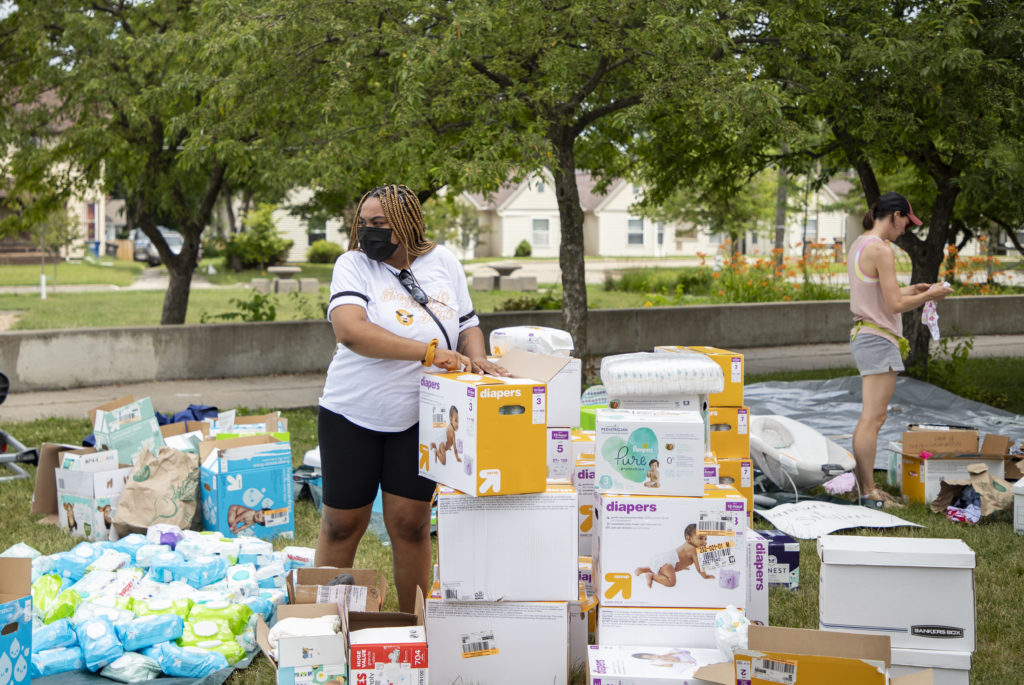
What have been some of your proudest accomplishments?
Quinn: I would say, and I will continue to say this until the day I die, it was our Celebration of Black Motherhood event. I was just amazed by how many people donated. There were so many mothers, fathers, grandmothers, grandfathers, aunties, uncles … whoever was the mother figure for a child, that were there. I was amazed at how well it was pulled off because we thought this up in a week or so. It was just amazing to see the smiles on their faces because they were able to get what they needed. The event was more of a joy event. Nobody was there to grieve over a death, it was centered around joy and love for our community. With [the deaths of] George Floyd and Breonna Taylor, it was hard. A lot of events were grieving events, so being able to give them joy and free stuff was awesome.
Hill: One would be getting our community garden up and going. We built it from our hands and from recycled materials and a lot of volunteers put in the work and showed up every day to water and take care of the plants and see it through. The second accomplishment would be the Hill-Quinn Legacy Grant. We launched that in February and we were able to give $700 away to 10 individual recipients, or $7,000 total. To have one named after us and what we hope to do, that was awesome and surreal.
Why do you do what you do?
Zakariyah: If not me, then who? I say that to myself all of the time. It gives me motivation to get out of bed and do the things that I do. I could easily just give up and say that someone else can take care of things. I have a lot of hope and a romanticized version of what the future could be, so I stick to that. I stick to the positive and the love and all of the good and fluffy things that could be. I wake up every day and make it a goal to get closer to the future.
Aaliyah: I would have to agree. If I wasn’t doing anything else, I wouldn’t be doing enough. I feel like the Supply Hive closes the thoughts of me not doing enough to change and help the community. I’m also a mother, so I do it for my son as well, because I want him to grow up in a Des Moines where there’s mutual aid and resources and opportunities for him.
Sweet Tooth Farm and Community Fridge: ‘Fresh food should not be a luxury item’
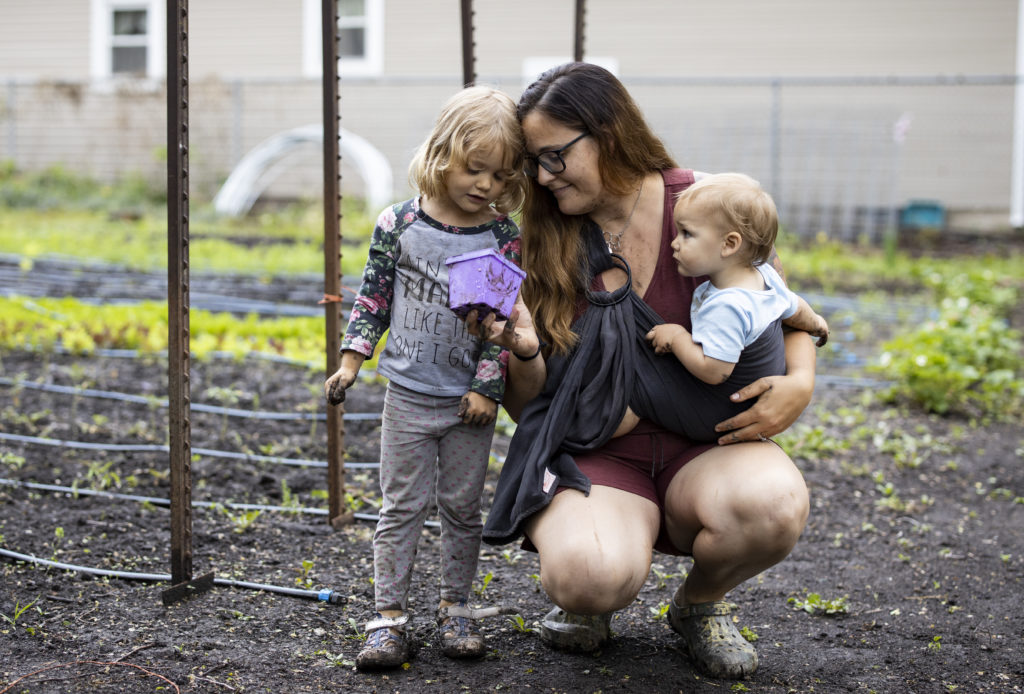
The story of how Monika Owczarski turned a dilapidated park into a community farm could have come straight out of the writer’s room of NBC’s “Parks and Recreation.”
When Owczarski and her husband moved to the River Bend neighborhood in 2013, their house sat a few yards north of Royal Park – a fifth-of-an-acre “pocket park” that was once home to a basketball court, swing set and slide.
The park, dedicated in the 1970s, had deteriorated to the point where it became an empty lot where criminal activity took place.
“The park was essentially a huge litter box,” Owczarski said.
She approached the city of Des Moines and said that something needed to be done. After years of working with the Parks and Recreation Department and talking with neighbors, she presented them a few options: The city could build a new house, put in a new playground, or let an adjacent property owner lease the space.
The city chose the lease arrangement.
Suddenly in the position of being a new mother who left her job working in a nonprofit mental health care setting to stay at home because of unaffordable child care costs, Owczarski found herself thinking about what she could do with the space.
At the same time, she recognized there was a severe lack of healthy food in the neighborhood and felt a responsibility to do everything she could to provide nutritious food to the community.
“[Before C Fresh Market was built,] the closest grocery store was the liquor store on the corner,” Owczarski explained. “So back then, kids would either go to Children and Family Urban Movement [CFUM] for dinner or walk to the liquor store and get Takis and a hot dog.”
After months of negotiations the city rewrote the lease to allow Owczarski to operate a commercial garden in the space, and in 2017 Sweet Tooth Farm was born.
Now Owczarski farms on 3 acres on plots spread throughout the River Bend neighborhood, and in December 2020 she organized the launch of Des Moines’ first community refrigerator.
The following conversation has been edited and condensed for clarity.
What was the driving force behind Sweet Tooth Farm?
I’m a pastor’s kid so I’ve always been thinking and talking about helping people, but in somewhat of a tangible and non-concrete way. When we moved here, we felt it important not to be the white people who asked the kids in the park to go home every night. So we did a lot of hanging out with the kids. I would go and serve breakfast at CFUM and build relationships with people. In having conversations with people about food, I realized that there were incredible gaps in food knowledge and access. I can drive wherever I want to get food. A lot of people in this neighborhood get their food on Saturday mornings at the church or by riding the bus to the grocery store.
If you’ve never had a garden or your family has never lived in a house, how would you know that carrots grow underground? How would you know that a pickle starts off as a cucumber? Kids were shocked at that stuff and the fact that there could be yellow and purple tomatoes.
That snowballed into starting a small farm. It felt like something we should be doing. At the beginning, I had no structure. I had no farm stand. With farming, you take a lot of risks, you try a lot of things and you learn a hell of a lot. There’s this phrase that I love, and it’s “If you want to be something, you have to just be it; and if you want to do something, you have to start doing it.” That message goes both for the fridge as well as the farm.
I have access to privilege. I have the privilege that I could maneuver and work within the city government to get them to let me do this. I’ve been working hard to use that privilege to help others to do this or figure out a way to do this, and to make sure I’m doing my best to grow food.
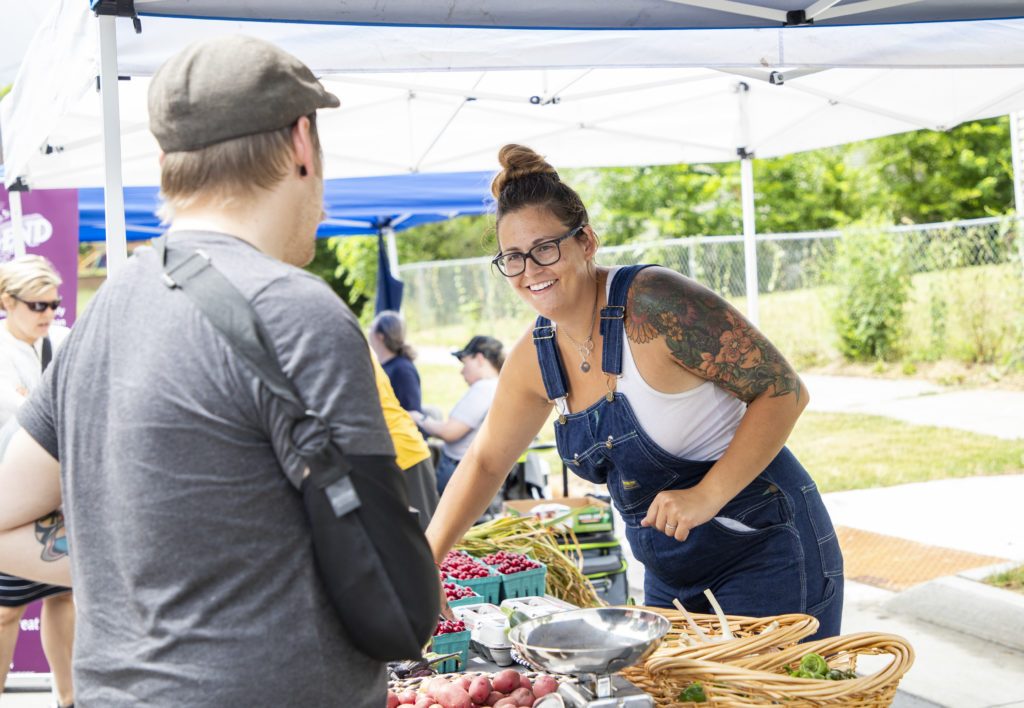
You led the launch of the Sweet Tooth Community Fridge in the latter half of 2020. Tell me about that.
As the pandemic hit, my neighbors and I saw an exacerbation of a need for food distribution in our neighborhood. CFUM wasn’t allowed in their building due to pandemic restrictions, so we relied on neighbors, restaurants, and different organizations and churches to continue their dinner program. While that was happening, I was making 100 portions of pasta in my house for CFUM and I was listening to a podcast called “Racist Sandwich” about community fridges. I thought to myself that providing groceries would be much easier than pulling together 100 hot meals every night from our kitchens. I texted Aubrey [Alvarez, executive director of Eat Greater Des Moines] and asked for a fridge. I said, “Wouldn’t it be cool if we could do that in Des Moines?” and she said, “I know, it would be so great.” I was included in a conversation about community fridges and there was a lot of talk about getting grants and permits. I asked, “Can I just do it? Can I just try? Could I do the beta?” They said, “If you can get the stuff, sure.” So I texted Aubrey on a Thursday, and that Saturday we went to Nebraska Furniture Mart and picked up a fridge and my husband built a shelter for it.
We see people come and get food from 6 a.m. to midnight, if not later. The fridge has gotten busier and more interconnected. A lot of people can’t donate financially, but they’ll clean every week or make sure the area around it isn’t too muddy. Everyone is an equal partner in the fabric of the fridge. [The progression of Sweet Tooth] is predicated and solely relies on relationships and being embedded in the community. I don’t think that the fridge or the farm would be successful if I didn’t have relationships with my neighbors and community stakeholders.
What are your goals for the farm and the fridge?
In the beginning, we just wanted the area to be a nice space. The neighborhood just wanted this to be quiet and pretty, because it was certainly none of those things before. My overarching goals for the farm and the fridge is using all of the relationships that I’ve formed and the community I built to leverage that for folks who don’t have the same opportunities as myself.
My ultimate pipe dream, which I don’t think will ever happen, is building a space where people who dream of doing this can access it much easier. This is our fourth full year of production so I’m still very much a beginner, but we make only $20,000. That’s after the year. That’s no paycheck from December to March. So the idea that somebody could do this, work 14-hour days and get paid nothing, it’s not realistic. I would love to have a space run by the municipal government that has infrastructure with long-term leases so that barriers are lowered … to build out so that more spaces can be utilized like this. And more people can do work that they find fulfilling and also feed more people. Even if there was something like this on every block, we still couldn’t feed Des Moines. There’s not enough.
I really do believe in my heart that fresh produce, fresh food shouldn’t be a luxury item. You shouldn’t have to decide between paying rent and buying fresh food. So that’s just another opportunity to get food out.
How can people use the fridge? What are the rules?
The people utilizing the fridge get to decide how much they need and how much they want. There’s no signup and there’s no registration. The only prerequisite is that you’re hungry or your family is hungry.
Don’t take pictures of anyone utilizing the fridge and don’t post pictures of you donating food. If you do, you will be asked not to come back. I feel very protective of the people who use this fridge. I don’t want anyone to ever feel like I’m using their struggle or their hardship to garner donations. The dignity and humanity of those who utilize this space is more important than a picture.
In terms of donations, no expired food. We ask that people bring what they would feed their own families. This is not a garbage dump.
If you make food at home, put a date and ingredients on it.
I know that folks are concerned about the legality of this. Some people don’t want to have refrigerators on street corners, which is fine. What we’re saying is that we know that people are struggling. When I was serving meals down at CFUM, so many parents were freaking out because they were barely surviving with their kids eating three meals a day outside of the house. So now that they were responsible for three meals for multiple children, that was a crisis. They were already utilizing food pantries and food banks. The thought that a family, a child, a houseless person, a neighbor, is going to bed hungry, to me is more worrisome than someone suing me for eating a bad piece of lettuce.
Why do you do what you do?
Because people are hungry. I struggle with that question because I feel like it romanticizes and creates a hero hierarchy. This is run by people. This is run by a community. I house the fridge, I pay the electric bill, but this isn’t just me. This is hundreds of people making small contributions every day. I find a lot of comfort in organizing with other like-minded people. Who wouldn’t do this? If you had the capabilities and the connections in the community, I think all of us have that in us that we could potentially do things like this. It’s tapping in and calling in on that community.
Editor’s note: On June 14, Sweet Tooth Farm and its sister organization, Radiate DSM, received a notice that the commercial garden leases at their lots near the Des Moines River will be terminated next year. It was unclear at time of publication how this might affect the organizations going forward, but the Sweet Tooth and Radiate DSM leaders feared it could effectively shut them down.
Great Plains Action Society: ‘We just had each other’
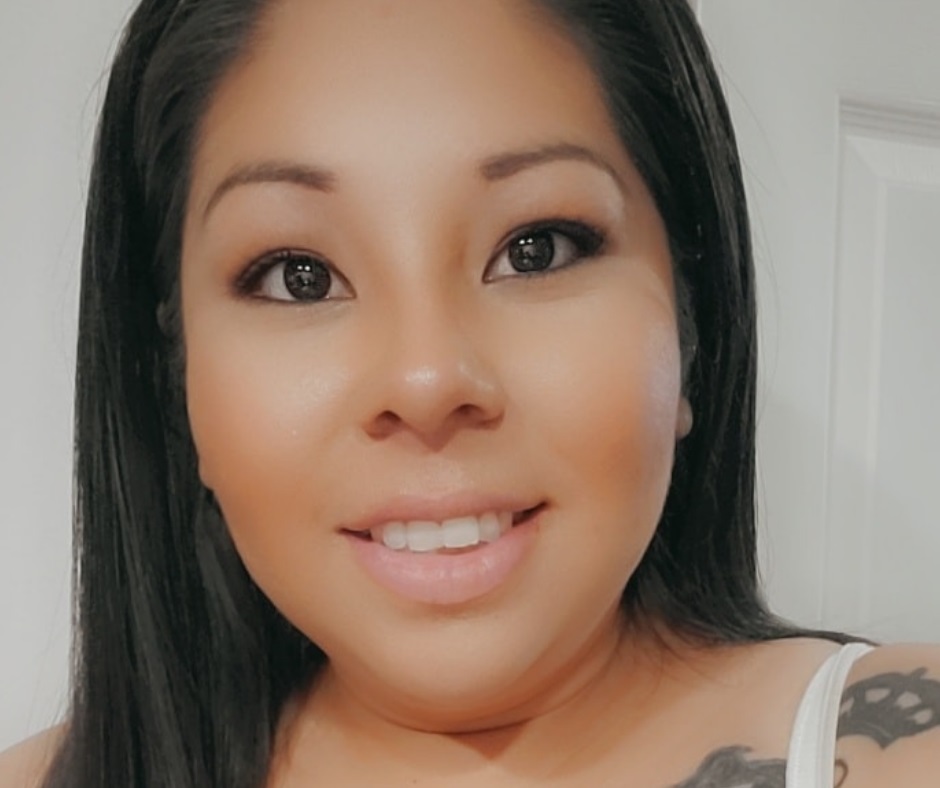
Great Plains Action Society networks across Iowa, South Dakota and into Nebraska, and organizers are building services to reach regional Indigenous reservations in the Midwest, said Trisha Etringer, operations and digital media director at Great Plains Action Society. First founded as Indigenous Iowa in 2014 by Christine Nobiss, the organization changed its name to Great Plains Action Society after Nobiss and Etringer met in 2017 and began organizing together.
“Any work that we do, we would like it to be Indigenous-led,” Etringer said. “These are our homelands and these are things that we’ve navigated through since the first contact with settlers. We’ve had to figure out how we are going to provide for our own, especially in rough times. … We just had each other, so we always like to keep that at the center.”
Ten staff members and a three-member board of directors lead the organization’s political engagement work in Indigenous-centered issues, such as food sovereignty and agriculture, voting rights, missing and murdered indigenous people, and climate change, Etringer said. Organizers are working with local law enforcement departments to implement cultural sensitivity training and a tribal liaison between the local Native American community and police.
“We had the police chief out to support our [Missing and Murdered Indigenous Relatives] event, and I do feel like they’re taking the initiative to be educated,” Etringer said. “Sioux City is so unique, because we already have this history of Chief War Eagle being very friendly to the white man. The relationship is already there. Today, Sioux City needs to be reflective of that. We’re navigating through this time together.”
The organization is also in talks with Sioux City about introducing food sovereignty programs and a community center to War Eagle Park, named after Chief War Eagle. The park is managed by Sioux City’s Parks and Recreation Department and is the burial site for seven indigenous graves.
“We want to have that space for the Indigenous communities to return back to the old ways. We could grow food for our communities. We could have teepees up, so maybe our homeless have a place to stay,” Etringer said. “We could create societies such as the Warrior Society, a women’s society so that way our women who have lost their path, or men who have lost their path, they can be reminded of how it used to be. Maybe that will inspire people to be empowered, to be native. It’s a beautiful thing. It’s a struggle some days, but it’s a beautiful thing.”
Business Record staff writer Kate Hayden contributed reporting on the Great Plains Action Society to this story.
Urban Dreams: ‘We’re not here to be a mile wide and an inch deep’
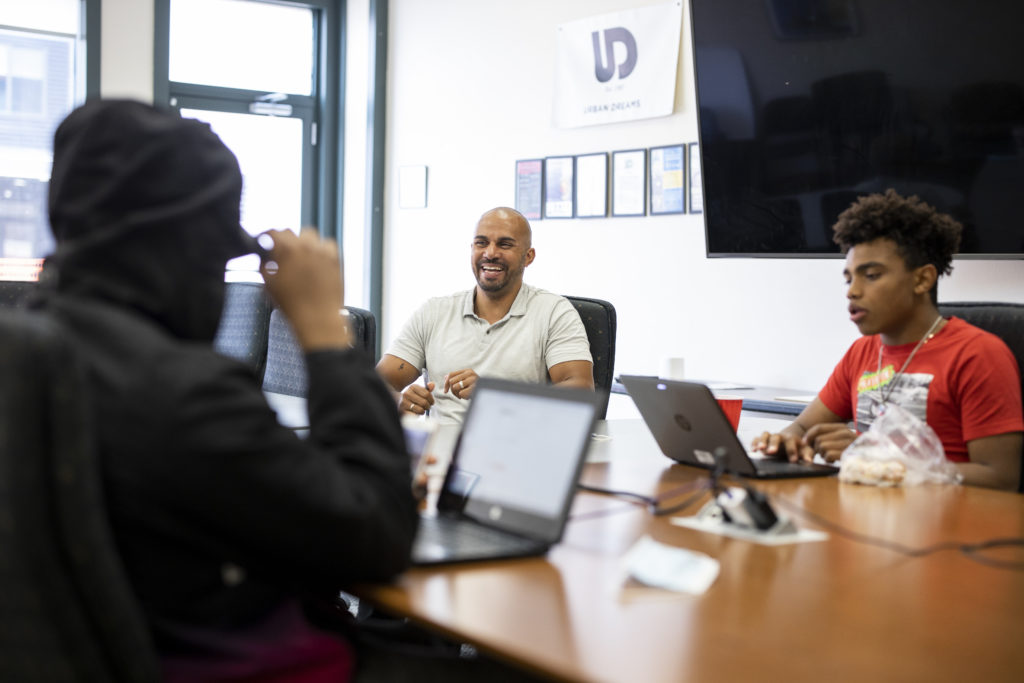
Editor’s note: Urban Dreams is not considered a mutual aid organization. However, we felt it was important to include them because of their long-standing position as a grassroots organization in the community. In the last year, Urban Dreams has worked in partnership with mutual aid and advocacy organizations like the Black Liberation Movement and Sweet Tooth Farm.
Izaah Knox was 8 years old when community leader Wayne Ford founded Urban Dreams, a nonprofit social services agency in the River Bend neighborhood of Des Moines that seeks to combat urban blight, poverty and substance abuse.
Originally designed to be a safe space for people to hang out and get information, Urban Dreams expanded its services over time, offering a handful of different programs including substance abuse and mental health treatment, workforce development training and opportunities, voter education, and community connectivity.
After nearly 30 years of serving as executive director, Ford asked Knox to succeed him.
Knox initially said no.
Yes, his first job out of college was at Urban Dreams as a reentry coordinator — a job that Ford hired him for despite a record of misdemeanors from when he was a teenager. But Knox wasn’t interested. He wanted to be a community college president.
Eventually, Ford and Wellmark Blue Cross and Blue Shield CEO John Forsyth struck up a deal over a two-hour breakfast that Knox couldn’t refuse. He would transition into the Urban Dreams executive director position over a three-year period. The first year, he would work at Wellmark 80% of the time, creating a high school internship program partnership with North High School. The next year, it would be 50% Wellmark, 50% Urban Dreams. The third year, 20% Wellmark, 80% Urban Dreams.
By 2017, Knox had fully transitioned into the role. In his four-year tenure, Knox has overseen the expansion of Urban Dreams to four new cities: Burlington, Cedar Rapids, Ottumwa and Sioux City; expanded race-based cultural competency training; hosted hundreds of events; upgraded all of the building’s technology; and raised millions of dollars.
This following conversation has been edited and condensed for clarity.
Is Urban Dreams a mutual aid organization?
No. We’re a very nontraditional nonprofit. A lot of the programming that we have, I think mutual aid organizations couldn’t do because of the scope of the work. That’s the major difference. Our substance abuse and mental health pieces … there are huge state audits every year and a lot of filing and record-keeping, so that may put us into a different category. We have full-on HR and accounting departments and a huge board of directors. That makes us different. I think we’re nontraditional because of the way we are, but I think more nonprofits should be like us: nimble, able to switch gears if we don’t feel like what we’re doing is serving the community in an adequate or responsible way. We should be able to say that we quit doing that program because it’s not what people need or want. So I think that’s what makes us nontraditional because we have pivoted so many times since 1985 to fulfill different needs.
Tell me what Urban Dreams was like back in 1985.
We were in the exact same building but it didn’t look anything like it does now. We were only open from 6 to 11 p.m. and we were just a place where people could stop by and get information and referral from different organizations. We didn’t even provide any services. The only services we had were a TV so people could watch the news, movies or sitcoms and we always had coffee. We had an old dial-up telephone so people could make phone calls if they didn’t have a phone. We took messages for people, too. We were a mailing address for people that were in transition or houseless. That was it: coffee, heat and air conditioning. We were built on treating people with dignity and respect, so we had a lot of people that would come in on drugs or were coming off drugs that lived in the streets or were working the streets. As we were having conversations with them, we tried to figure out what they needed and then started developing programming around that. So that’s how we got our substance abuse program. We have one of the biggest and longest-serving Narcotics Anonymous meetings in the community. So I guess that could be mutual aid because we don’t run it – they run it, we just give them the space to do it.
How would you describe Urban Dreams?
Our mission is to build bridges and break down barriers for people so we can connect them with opportunities outside and inside our community. We try to tear down some of those stereotypes that are out there as well. We build relationships and treat people with dignity and respect at all times. Wayne Ford, the founder, used to say that we treat the dope addict and the prostitute just like we treat the governor or the president of the United States, and they’ve all been here. If they don’t give [respect] back, we say, “Hey, today is not your day, come back tomorrow.”
We’re a food pantry, we’re information and referral, we have workforce development, substance abuse, mental health and community connectivity. So that’s what we do for programming. We did more when I started six years ago but as I started transitioning over to the executive director position, there were a couple of things that weren’t as effective in the community and were more of a strain on the organization to try to implement. We’re not here to be a mile wide and an inch deep, but to be an inch wide and a mile deep with our services. That’s good and bad because a lot of people want us to do more because they know we can and they know that we’ll do it effectively and we’ll do a really good job at it. Des Moines Public Schools started sending us kids about four years ago. Since then, every year they send us more and we have more success so they want to send us more. It’s good, because it’s organic and happens naturally. But if it’s just chasing grants and dollars, sometimes we say no. A lot of traditional nonprofits create programming around a grant opportunity, which may or may not be the best thing for the community or their organization, so we try to stay away from that.
You talk a lot about the importance of community. Why is that important?
I live less than a mile away from our building. Most of my staff live really close as well. So this is the community where we live. Having a better community where people can achieve their dreams and feel like there’s some hope for the future benefits us as well. If people feel hope, they’re probably not going to break the law. If they have a good job, they’re going to do all of the things to be contributing members of society, which we all want. Funny story, I was in a meeting and somebody asked me what the kids we work with, who are at risk and get into trouble, want. They want the same things that any kid wants. They want to have hope for the future, they want to have a job, they want to be able to buy a house and a car and send their kids to college. They want the same things as everyone else: opportunities and hope for the future.
Who does Urban Dreams serve?
Everybody and anybody. If you look at our data, the household size is about 3.25. About 55% are people of color. About 80% are living under the poverty line. Most of the people are from this ZIP code or the surrounding ZIP codes in Des Moines. Our Latino population is growing, probably because of word of mouth and the expansion of the food pantry. Mostly people 16 and above. For the workforce development and substance abuse programs, it’s mostly people between 25 and 40.
What drew you to Urban Dreams?
The first job I got out of college was here at Urban Dreams as the reentry coordinator. Wayne Ford hired me. I didn’t think I was going to be in human services. I didn’t go to school to be in human services. I didn’t even know Urban Dreams existed at the time. I ended up being here for three years, left and went to Mid-Iowa Family Therapy Clinic, went to EFR, went to DMACC and then Wellmark Blue Cross Blue Shield and then back here. Wayne asked [me to be the executive director] and I said no. We had a good relationship but we didn’t talk every day, so when he asked me, I was shocked. I wanted to be a community college president, I was working on my Ph.D. at Iowa State and I was traveling around the country seeing how different community colleges worked. John Forsyth at Wellmark called me up and said, “Wayne Ford has this crazy idea and I want to make sure we can pull it off.” So we sat down for two hours at breakfast and left with a plan. I love it here. We’ve had some success, but we still have a couple of things to accomplish before I’m ready to leave. I don’t want to be Wayne Ford and be here for 32 years. He tells me all the time to never say never, but I don’t know if I want that. We have some things to do.
What’s next for Urban Dreams?
There’s more workforce development options. Kids that are 14, 15, 16 years old are hard to employ because most of the employment opportunities in our neighborhood are taken by their parents or older adults. If you go to the MLK Hy-Vee, you won’t see a lot of kids working there like you see at Hy-Vees in the suburbs. So these kids don’t get the opportunities to get the first-work experience that will then catapult them into the future. Making a mistake at work when you’re 16 is different than making a mistake if you’re 20, even if it’s your first job, because you’re looked at differently. The 20-year-olds could lose their job instead of getting a second chance. So expanding that here in this area is going to be super important. We have to make sure that we’re preparing people with real-world work experience because I don’t know what’s going to happen academically with the pandemic.
